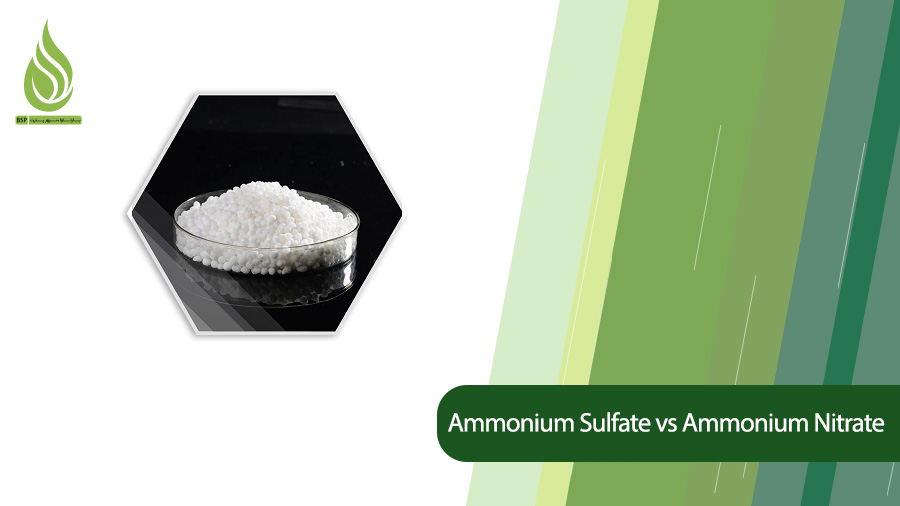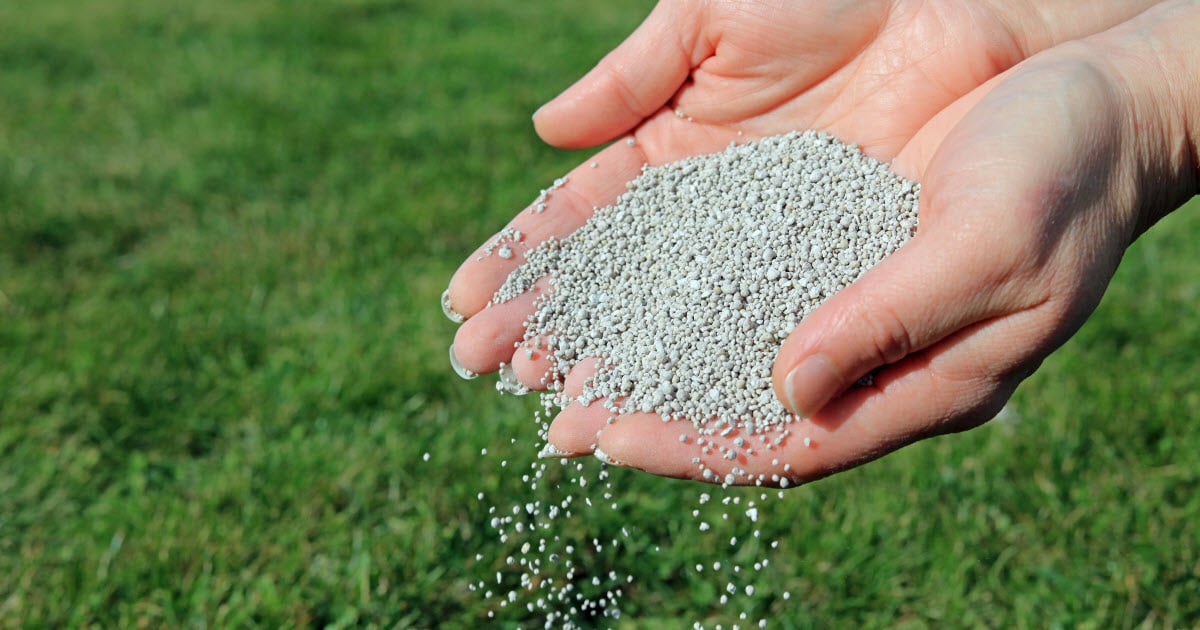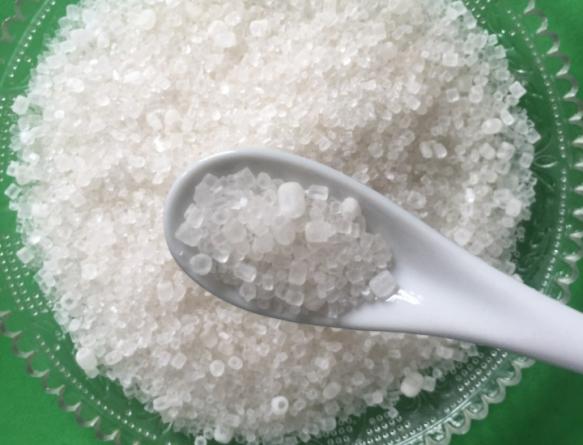
Comparing Ammonium Sulfate and Ammonium Nitrate Fertilizer (Application &Timing)
Ammonium nitrate and ammonium sulfate are two types of chemical nitrogen fertilizers. These fertilizers are applied to fields and orchards during various seasons to supply part of the nitrogen that plants need. These two chemical fertilizers differ in their composition and effectiveness. In this article, we’ll compare ammonium sulfate and ammonium nitrate fertilizer, and we’ll examine key points about these nitrogen-based fertilizers (also known as nitrogenous fertilizers).
What is Ammonium Nitrate?
Ammonium nitrate is a chemical compound with the formula NH₄NO₃. This substance consists of ammonium and nitrate ions. Ammonium nitrate falls into the category of nitrogen fertilizers used to provide the nitrogen that plants require. Ammonium nitrate is soluble in water, which allows for quicker absorption of the fertilizer. The rapid absorption of ammonium nitrate ensures that plants’ nitrogen needs are met, leading to better plant growth.
Ammonium nitrate is an endothermic substance, meaning it absorbs heat and lowers the temperature of the surrounding environment. This makes it suitable for plants growing in alkaline soils. Although ammonium nitrate has widespread applications in agriculture, it must be used under appropriate conditions on farmland. Overuse of this fertilizer not only provides no benefit to the plants but can also lead to soil and environmental pollution. Excessive use of ammonium nitrate acidifies the soil and reduces its fertility, which over time weakens plants and can cause them to die off.
Ammonium nitrate isn’t just used as an agricultural fertilizer; it’s also employed in other industries. The most important applications of ammonium nitrate include:

- Agricultural Fertilizer: Ammonium nitrate is a widely used nitrogen fertilizer in agriculture that boosts crop yields.
- Explosives and Blasting Materials: Ammonium nitrate is a key ingredient in producing many explosives, such as ammonium dinitrate, which is used in mining and construction industries. It’s also used to make fireworks products.
- Livestock Farming: Ammonium nitrate is sometimes added to animal feed as a protein source.
- Chemical Industries: Ammonium nitrate is involved in producing certain chemicals like nitric acid and ammonia.
- Plastics and Dye Industries: Ammonium nitrate serves as a raw material for producing some dyes and plastic materials.
- Food Industry: In the food industry, ammonium nitrate is used as a preservative and quality enhancer for food products.
Note: Ammonium nitrate is suitable for plants growing in alkaline soils.
What is Ammonium Sulfate?
Ammonium sulfate is a chemical compound with the formula (NH₄)₂SO₄. This substance is used to supply the nitrogen that plants need. Ammonium sulfate contains 21% nitrogen and 24% sulfur. The presence of sulfur in ammonium sulfate helps amend and lower the soil’s pH, balancing it out. The nitrogen form in ammonium sulfate has a positive charge, which allows it to bind well with soil particles, making it less prone to leaching or evaporation.
Ammonium sulfate offers many benefits for plants and trees. Primarily, it contributes to the health and growth of plants and trees. It also improves product quality and can help increase plants’ resistance to diseases.
Ammonium sulfate can be applied in solid or liquid form. For solid application, add it directly to the soil and then irrigate. For liquid application, mix it with water and then apply the solution to the soil.
Ammonium sulfate has diverse applications across various fields:

- Agricultural Fertilizer: Ammonium sulfate is a nitrogen and sulfur fertilizer used to increase yields and enhance soil fertility in agriculture. It has broad applications in farming.
- Chemical Industries: Ammonium sulfate is a raw material in producing certain chemical products like sulfuric acid, ammonia, and nitric acid. It’s also used in making some detergents and cleaners.
- Food and Pharmaceutical Industries: This substance is used in the food industry to adjust the acidity of food products and in some medications as a moisture absorber.
- Textile Industry: Ammonium sulfate is employed in dyeing processes and color fixation in the textile industry.
- Livestock Farming: It’s used in animal feed as a protein source.
Note: Ammonium sulfate has an acidic pH and is more suitable for plants growing in acidic soils.
Comparison of Ammonium Sulfate and Ammonium Nitrate

Ammonium nitrate and ammonium sulfate are both ammonium-based compounds, but they differ in some features and applications. Below, we’ll compare ammonium sulfate and ammonium nitrate from various perspectives.
- Ammonium nitrate is a combination of nitrate nitrogen and ammonium. In contrast, ammonium sulfate is a source of ammonium nitrogen and sulfur.
- Ammonium nitrate contains 34% nitrogen, whereas ammonium sulfate is composed of 21% nitrogen. Therefore, to meet plants’ nitrogen needs, larger quantities of ammonium sulfate are required.
- Ammonium nitrate has a neutral pH. This fertilizer is suitable for plants growing in alkaline soils. However, ammonium sulfate has an acidic pH and is better suited for plants in acidic soils.
- Ammonium nitrate dissolves easily in water, but ammonium sulfate is not as soluble in water as ammonium nitrate.
- The absorption of ammonium sulfate is slower than that of ammonium nitrate. This is due to the higher solubility of ammonium nitrate.
- Ammonium nitrate has oxidizing properties and can be harmful to the environment. It may cause nitrate pollution in groundwater. But ammonium sulfate lacks oxidizing properties and is safer for the environment.
- Ammonium nitrate’s high solubility leads to a greater risk of leaching compared to other nitrogen chemical fertilizers. Ammonium sulfate, with its lower solubility, has less leaching potential and causes less damage to the soil.
- Ammonium sulfate is more expensive than ammonium nitrate.
In this section, we’ve compared ammonium sulfate and ammonium nitrate. Overall, both ammonium nitrate and ammonium sulfate are among the most commonly used nitrogen fertilizers for supplying plants’ nitrogen requirements. Which one is suitable for your land depends on the type of plant, soil conditions, and climate.
These two substances differ in chemical formula, nutrient composition, chemical properties, applications, and several other aspects. You can choose one of these fertilizers based on your plants’ needs. However, using a combination of ammonium nitrate and ammonium sulfate is also a good idea. This approach provides multiple plant nutrients simultaneously. By combining the two fertilizers and complementing their positive effects, agricultural productivity improves, and the degradation of soil structure is minimized. Of course, the ratio and amount of each fertilizer must be adjusted according to the plants’ and soil’s needs.
To further illustrate the key differences, here’s a table summarizing the distinctions between ammonium sulfate and ammonium nitrate:
| Aspect | Ammonium Nitrate (NH₄NO₃) | Ammonium Sulfate ((NH₄)₂SO₄) |
|---|---|---|
| Chemical Composition | Combination of nitrate and ammonium nitrogen | Ammonium nitrogen and sulfur |
| Nitrogen Content | 34% nitrogen | 21% nitrogen |
| pH Level | Neutral pH; suitable for alkaline soils | Acidic pH; suitable for acidic soils |
| Solubility in Water | Highly soluble; quick absorption | Less soluble; slower absorption |
| Environmental Impact | Oxidizing properties; risk of groundwater pollution and leaching | No oxidizing properties; safer, lower leaching risk |
| Additional Nutrients | None beyond nitrogen | Contains 24% sulfur, which balances soil pH |
| Price | Generally cheaper | More expensive |
| Risks of Overuse | Acidifies soil, reduces fertility, pollutes environment | Less harmful; helps amend soil |
| Absorption Speed | Fast | Slow |
This table highlights the primary differences to help farmers and gardeners make informed decisions based on their specific needs.
How to Use Ammonium Sulfate and Ammonium Nitrate
The best time to apply ammonium nitrate fertilizer is during the early stages of plant growth. In these initial phases, plants require more nitrogen. Receiving additional nitrogen accelerates plant growth. For some crops, applying ammonium nitrate in later growth stages is also necessary. For fruit-bearing trees, using ammonium nitrate fertilizer during flowering and fruit formation stages can help increase yields. The type of crop, weather conditions, and soil conditions are factors that influence the timing of ammonium nitrate application. For crops with short growth periods, ammonium nitrate is typically applied in the early growth stages. In hot and dry climates, it’s better to apply ammonium nitrate early to prevent nitrogen evaporation. The amount of ammonium nitrate used also depends on the crop type, weather, and soil conditions.
The method of applying ammonium sulfate fertilizer is determined based on the plant’s and soil’s needs. However, there is generally a global standard for using ammonium sulfate. Ammonium sulfate is applied in three periods, usually in the months of April, June, and September.
As a final note, we emphasize that determining a plant’s needs, along with the amount and timing of fertilization, is a highly specialized matter. For fertilizing farmland or orchards, it’s best to seek the expert opinion of an agricultural specialist.